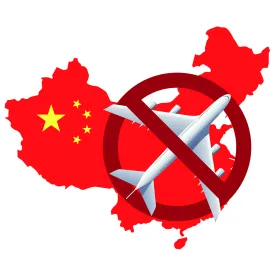On May 29, 2020, President Trump issued a proclamation (the “Proclamation”) suspending entry of citizens of the People’s Republic of China (“PRC”) who meet both of the following criteria: (A) the individual is seeking to enter the U.S. on F or J nonimmigrant status; and (B) the individual has an association with an entity in the PRC that implements or supports the PRC’s “military-civil fusion strategy” (a “PRC Military Entity”): (i) the individual has received or currently receives funding from a PRC Military Entity; (ii) the individual has been employed or is currently employed by a PRC Military Entity; (iii) the individual studied or currently studies at a PRC Military Entity; (iv) the individual has conducted research on behalf of or currently conducts research on behalf of a PRC Military Entity; or (v) the individual has conducted research at or currently conducts research at a PRC Military Entity
Similar to other proclamations the Trump administration has issued recently regarding immigration, the Proclamation contains a number of exceptions. Chiefly, the Proclamation provides an exception for students pursuing undergraduate study, and therefore it will generally affect graduate students and doctoral researchers. Additionally, the Proclamation excepts the following individuals, among others as more fully defined in the Proclamation:
-
Spouses of U.S. citizens or lawful permanent residents (i.e. green card holders);
-
Any individual who is a member of the U.S. Armed Forces;
-
Any individual who is a spouse or child of a member of the U.S. armed forces;
-
Any individual whose entry would be in the national interest or would further law enforcement objectives; and
-
Any individual who is studying or conducting research in a field involving information that would not contribute to the PRC’s military‑civil fusion strategy, as determined by the Secretary of State and the Secretary of Homeland Security, in consultation with the appropriate executive departments and agencies (agencies);
The exception for individual’s studying or conducting research in a field involving information that would not contribute to the PRC’s military‑civil fusion strategy appears to provide wide discretion for the Secretary of State and the Secretary of Homeland Security to except individuals from this proclamation. The Proclamation does not define “military-civil fusion strategy.” Secretary of State Michael R. Pompeo has previously described it as “technology-seeking” by the Chinese military and also “the ruthless acquisition and systematic diversion to military purposes of technologies such as artificial intelligence, quantum computing, aviation and aerospace, Big Data applications, and civil nuclear power.” Therefore, entities with ties to the Chinese Military may be considered by the U.S. government to be PRC Military Entities, and any individual who falls under the association categories listed above may be subject to the Proclamation.
To implement the Proclamation, the president has directed the Secretary of State or his designee to establish standards and procedures to identify individuals subject to this Proclamation. The practical effect of this direction may be enhanced scrutiny of F and J visa applicants who hold PRC citizenship. While the terms of the Proclamation may appear narrow, the additional documentation burdens and challenges that the Secretary of State may create by implementing the Proclamation could potentially have a chilling effect with respect to PRC citizens seeking F and J visas, regardless of whether they fall under the terms of the Proclamation. As such, the Proclamation may lead to a reduction in the number of PRC citizens who attempt to study in the United States; there are currently over 350,000 such students. A decline in that number would likely result in a negative economic impact on the U.S., as the economic impact of citizens of the PRC studying in the U.S. and their families was recently estimated by the NAFSA: Association of International Educators that economic impact at $13 billion.
As part of the implementation, the Secretary of State is also directed to consider whether any citizens of the PRC currently in the United States would be subject to the Proclamation and should have their visas revoked. This may affect PRC citizens currently living and working in the United States on F or J visa status, as well as their employers, if any, and the schools they attend. The Proclamation also directs the Secretary and State and Homeland Security to review other nonimmigrant and immigrant visa programs to determine if they pose a risk with respect to the PRC’s acquisitions of sensitive U.S. technologies and intellectual property, and to take action generally to further mitigate any risks posed by the PRC’s acquisitions of sensitive U.S. technologies and intellectual property. Similarly, the Secretary and State and Homeland Security are directed to consider issuing updated regulations and guidance regarding the inadmissibility of individuals seeking entry to the United States who are or have been a member of the Communist or any other totalitarian party.
The Proclamation is effective at noon on June 1, 2020, and has no expiration date. As with other proclamations, nothing in the Proclamation limits the ability of an individual to seek asylum, refugee status, withholding of removal, or protection under the Convention Against Torture and Other Cruel, Inhuman or Degrading Treatment or Punishment.



 />i
/>i
